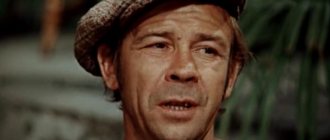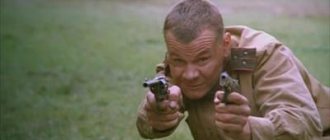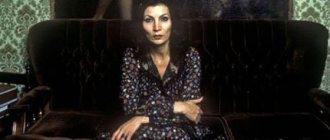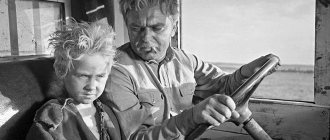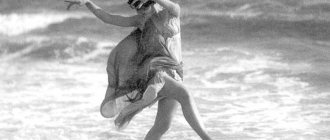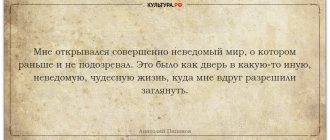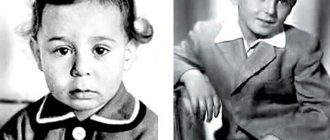Anatoly Dmitrievich was born in 1922, in the family of a career officer and a milliner. His father served in Vyazma, where the future artist spent his childhood. At the garrison, amateur activities were developed, which included Papanov Sr. He was often noted as an artist, but Dmitry Papanov did not take professional steps towards dramatic art.
When children were needed in an amateur performance, the military remembered the artistic children of the Papanovs, so Anatoly Dmitrievich and his sister often appeared on stage as small children.
In the 30s, the Papanovs were transferred to the capital, where Tolik went to school. The boy, accustomed to freedom and self-expression, did not like sitting at his desk and did not like school subjects. By graduation, I barely straightened out my grades from two to three in order to receive a certificate. He never dreamed of entering a university - he went to work as a foundry worker at a factory, but all this time he remembered his acting childhood and cherished the dream of one day becoming an actor.
Biography
Looking at the comedic images in which the actor appeared on the screen, one could not so easily guess that Anatoly Dmitrievich Papanov was a man with a difficult fate. Despite the horrors of the war, seen with his own eyes, the artist until the end of his days retained optimism and a radiant smile that inspired the audience of the Soviet Union.
Monument to Anatoly Papanov in Vyazma
During his work in cinema and theater, the artist received many awards recognizing his achievements, and in 1976, Soviet astronomer Lyudmila Chernykh named asteroid No. 2480, which she discovered, after the actor. In 2012, 25 years after the artist’s death, a monument was erected to Anatoly Dmitrievich in his small homeland - in the city of Vyazma.
Childhood and youth
Anatoly Papanov was born in Vyazma, Smolensk province, on October 31, 1922, during a turning point for the state. Anatoly’s father is officer Dmitry Filippovich, and his mother is milliner Elena Boleslavovna, a Polish woman who secretly converted from Catholicism to Orthodoxy. The parents were people of imperial temperament and disapproved of the changes around them. In addition, the couple were Christian believers and raised their children in religious traditions.
Young Papanov adored his parents, especially his strict but attentive father, and strived to be like him. Papanov Jr. also inherited his love for theatrical art from his parents. Dmitry Filippovich was interested in acting from his youth, constantly participated in amateur performances and organized some of them.
Anatoly Papanov in childhood
At the end of the 20s, the Papanov family moved to Moscow. There Tolik went to school, but studies did not attract the boy. Young Papanov was a hooligan, switching from two to three, and as a result, he graduated from the educational institution with difficulty. With such marks, the young man did not even think about higher education. He got a job as a foundry worker in a factory repair shop and took up acting.
A friend of Papanov once invited him to audition for the Theater of Working Youth, and the rude, sincere young man somehow attracted the attention of the selection committee. He quickly became a star in the troupe, and it seemed that he had a bright future ahead of him.
Anatoly Papanov in his youth
However, the Great Patriotic War soon broke out, and the young worker was called to arms on its very first day. For three months Papanov learned to operate anti-aircraft guns, after which the entire group was sent to the front. Later, the great actor recalled the horror he had to go through. There was a case when most of the company, consisting of the same youths as Papanov, died under fire. Anatoly himself miraculously made it out alive, although wounded; the young man had to have two toes amputated. After this, Papanov could not walk normally, and therefore was demobilized.
Anatoly Papanov went through the war
However, the young man did not go home immediately. For several months, the soldier, as part of the creative team he had assembled, traveled to front-line hospitals, supporting his fellow sufferers with songs, poems and impromptu performances, which were invariably successful. Then Papanov thought that perhaps creative acting was his calling. Finding himself in Moscow again, the young man decided to enter the theater institute.
War
Come Tomorrow (1962)
As a young boy, worker Papanov went to the Theater of Working Youth as a hobby. He was lucky: the teachers there liked him. They set about training a simple-minded, but sincere and cheerful young man.
In the late 30s, the actor even had a chance to play a cameo role in the film “Lenin in October” and believed that he would become a real artist. But the plans of the dreamy young man were interrupted by the war.
He was among the first to be called to the front. At first he studied the intricacies of anti-aircraft missile forces, then he was thrown to the first line of the front. Later in his interviews, the actor recalled what nightmares he had to go through...
One day his entire squad died under merciless fascist fire.
Papanov survived by some miracle, but lost several toes in the hostilities. The wounded soldier was taken to the hospital, from where he was discharged. But he had no intention of leaving the front. He gathered a creative team and traveled with them to hospitals to raise the morale of the wounded.
The reaction of his new viewers showed that he succeeds in acting. Now he was waiting for the end of the war and firmly decided to devote himself to dramatic art.
Theater
Anatoly came to GITIS after the entrance exams were over. But since the institution had a shortage of students, the rector of the institute, Mikhail Tarkhanov, suggested that the future actor try to enroll right now, after reading some of the poems. After listening, Mikhail Mikhailovich was surprised by the professionalism of the applicant. As a result of a short conversation, Papanov was accepted into the university and immediately enrolled in the 2nd year.
On stage Roman Tkachuk, Anatoly Papanov and Mikhail Derzhavin
Initially, the actor did not stand out among the students, but as soon as rehearsals began, it became clear that this young man was a man of outstanding talent. When the young actor graduated from the educational institution in 1946, he was already known in Moscow theater circles. Papanov was invited to the Moscow Art Theater and the Maly Theater, and the young man received other prestigious offers. However, Anatoly refused and, together with the rest of the course and his young wife, went to Lithuania, however, the actor did not stay there for long.
In 1948, director Andrei Goncharov offered Papanov and his wife a place at the Satire Theater, and the couple moved back to Moscow. This proposal influenced the entire future life of the couple. In his youth, the actor played only episodic and minor roles. Only in 1954 was he entrusted with a significant role - there was an urgent need to replace a sick colleague.
Anatoly Papanov in the theater
After the premiere, the directors finally saw potential in the man. After 3 years, the artist received his first central role. The success of the performance with his participation was so loud that the expression “go to Papanov” appeared in theater circles. Even from the famous Kisa Vorobyaninov, Papanov managed to make a deep, tragic figure, changing the perception of this image for the average theatergoer.
In 1962, the artist took part in the production of the play “Heartbreak House” by Bernard Shaw. Few people dared to stage this work of exceptional complexity.
Anatoly Papanov in the play “The House Where Hearts Break”
The actors of the Satire Theater did more by creating a television version of the play. Papanov played the role of Mangan. During his creative biography, Papanov took part in many performances, including productions of “A Profitable Place” by Alexander Ostrovsky, “The Inspector General” by Nikolai Gogol, “Woe from Wit” by Alexander Griboedov and others. In 1987, he made his debut in his native theater as a director with the play “The Last” based on Maxim Gorky.
Movies
Anatoly Dmitrievich was an actor of the highest level, but his relationship with the film industry did not improve immediately. According to colleagues, Papanov was simply hypnotized by the camera, and for a long time he could not fully open up on the set, so at first he appeared mainly in supporting roles.
The first time young Anatoly Papanov appeared on screen was before the war, in the film “Lenin in October.” After 2 years, the filmography of the aspiring artist was replenished with an episode in the comedy “Foundling”. The artist’s comedic talent began to be revealed in films decades later in the films “Man Follows the Sun”, “Come Tomorrow...”, “Apple of Discord”.
Anatoly Papanov and Ekaterina Savinova in the film “Come Tomorrow”
In 1963, Anatoly Dmitrievich received an offer from director Alexander Stolper, who was preparing the war drama “The Living and the Dead” for release. Papanov was supposed to play the general, but the artist himself did not believe in his dramatic talent and refused the director several times.
After the premiere of the film, the actor woke up famous. The film was watched by 41 million viewers. A photo of General Papanov appeared on the cover of an issue of the Soviet Screen magazine and on a 1966 USSR postage stamp. This role was awarded at the 1st All-Union Film Festival with an award for best actor.
Anatoly Papanov in the film “The Living and the Dead”
Film directors also paid attention to the main discovery of the year, and after a while Anatoly Papanov shone in diverse images in the films “Native Blood”, “Stitches-Paths”, “Give me a Book of Complaint”, “Children of Don Quixote”. The artist played the main roles in the drama “Our House” and in the war film “Retribution”.
Anatoly Papanov also appeared in Eldar Ryazanov’s popular comedy “Beware of the Car,” where he played in an ensemble cast with Innokenty Smoktunovsky, Oleg Efremov, Olga Aroseva, and Andrei Mironov. Among the actor’s high-profile works are roles in the films “Belarusian Station”, “Gentlemen of Fortune”, “12 Chairs”.
Anatoly Papanov and Andrey Mironov
The artist has 2 film roles that were especially remembered and loved by Soviet audiences. The first image is the smuggler Lyolik from the comedy “The Diamond Arm”. The USSR Arts Council did not like the picture, but the people of the socialist republics simply fell in love with it. Many of the charming villain’s phrases became catchphrases, and Papanov was recognized on the streets until the end of his life thanks to his role in “The Diamond Arm.”
Anatoly Papanov in the film “The Diamond Arm”
The second image helped Anatoly Dmitrievich reveal his dramatic talent on the screen. In the film “Cold Summer of '53...” the actor played the political exile Kopalych, then the artist’s skill was highly appreciated by critics and colleagues. Unfortunately, the artist himself died before he could reap the fruits of his well-deserved fame.
Anatoly Papanov in the film “Cold Summer of ’53”
Anatoly Papanov was also remembered for his work at the dubbing studio. The heroes of the Soviet cartoons “Rikki-Tikki-Tavi”, “The Little Engine from Romashkov”, and “Golden Boy” speak in the voice of the People's Artist.
The most popular character performed by Papanov was the Wolf from the animated almanac “Well, wait a minute!” The creative tandem of Anatoly Dmitrievich and his voice-over partner Klara Rumyanova became one of the most famous duets of Soviet animation.
Anatoly Papanov and Klara Rumyanova
After the cartoon was released, Anatoly Papanov received bags of letters from young viewers. In an interview, the actor explained that he does not consider his hero scary and insidious at all, and over time the Wolf completely acquires noble traits.
Brief biography of Papanov
Anatoly Dmitrievich Papanov was born on October 31, 1922 in Vyazma, Smolensk region. The actor gained popularity only at the age of forty, before that there was the Great Patriotic War, injury and disability, which he hid for so long for the sake of his beloved work.
Childhood, youth, study
Figure 2. 1941
The family of the future People's Actor of the USSR moved to the capital when Tolya was 8 years old. Here he went to school, and at the age of 17 he began attending drama classes at the House of Culture. His first attempts at feature films came in 1937 – he played an inconspicuous sailor in the film “Lenin in October” and discovered the road to cinema. As he later recalled the pre-war years, he acted “a lot and successfully.”
Since the beginning of the Great Patriotic War, he joined the ranks of volunteers. Having received the rank of senior sergeant, he began to command a platoon of anti-aircraft gunners. On March 22, 1942, near Kharkov, he was seriously wounded - severe damage to his right leg and amputation of two fingers. So, at the age of 21, Papanov became a disabled person of the third group and was discharged.
Having returned from the front, despite the fact that for the first few years he was forced to walk with a cane, he entered the second year of GITIS. In 1946 he successfully completed his studies, receiving an invitation to join several leading theaters in the capital. However, not wanting to part with his wife, whom he met and married during his studies, he leaves with her for the Lithuanian city of Klaipeda to found a new theater.
Later, after the death of her beloved husband, the actor’s widow recalled their acquaintance: “He was a tall young man in a faded tunic, in military uniform. He was wounded, limped badly and walked with a stick... He studied a lot with a movement teacher. And the results showed immediately, after a couple of months he began to walk without a cane, he even learned to dance.”
Popularity
Figure 3. “Your mustache... Has come unglued” (Diamond Arm)
On the theater stage, artist Anatoly Papanov shone in productions of any complexity. He even managed to play the difficult role of Mangan in Bernard Shaw’s play “Heartbreak House,” which few had ever achieved before. It was not possible to establish relations with the film industry for a long time. As contemporaries recalled, Anatoly for a long time could not completely liberate himself under the camera lenses.
The actor took part in the filming several times, but none of the roles became famous. Only in 1963, after working in “The Living and the Dead,” Papanov gained popularity.
A little later, several more works appeared that secured Papanov’s fame as a brilliant performer of comedic roles. His Lyolik, Kisa Vorobyaninov, father-in-law Semitsvetov from “Beware of the Car” will forever remain in the history of cinema.
A solid baritone allowed him to build a wonderful career in voicing the heroes of Soviet cartoons. Anatoly Papanov was involved in voicing the Wolf from “Well, wait a minute!” While bunnies often spoke in the voice of Georgy Vitsin, bears, wolves, lions and all sorts of negative characters spoke in Papanov’s voice.
Friends, acquaintances
Figure 4. “I sell strawberries grown in my dacha.” ("Watch out for the car")
It cannot be said that Papanov and A. Mironov were best friends, but they often communicated. The artists played together in several famous films, each of their roles became unique in its own way. The discovery of the duet is the merit of Eldar Ryazanov. He saw something unique in them: one was a young actor with an aristocratic face, the other was a seasoned front-line soldier, straightforward and stern.
This is exactly how the friends first appeared on screen in the film “Beware of the Car.” Later, in Gaidai’s comedy, they chased smuggled diamonds hidden in plaster, and in “12 Chairs” they hunted for chairs in which the wealth of Ippolit Matveevich Vorobyaninov’s mother-in-law was hidden.
In addition to Mironov, the artist was on good terms with M. Derzhavin, A. Shirvindt, G. Vitsin, Yu. Nikulin and many other outstanding personalities of the golden era of Soviet cinema.
Personal life
The only wife of Anatoly Papanov was Honored Artist of the RSFSR N. Yu. Karataeva. The young people met during their student years, married in 1945, and 9 years later their only child was born: daughter Elena (b. 1954), who also became an actress.
Figure 5. With his wife in the kitchen
Filmography
The filmography of Anatoly Papanov includes 170 completed works.
From the entire huge list, we can note several films included in the Golden Reserve of Soviet Cinema. Table 1. Selected filmography of A. D. Papanov
| Title of the painting | Year of premiere | Characters played |
| Come back tomorrow | 1962 | Sculptor |
| Living and dead | 1964 | Brigade commander |
| watch out for the car | 1966 | Semitsvetov's father-in-law |
| Two comrades served | 1968 | Regimental Commander |
| The Diamond Arm | 1968 | Lyolik |
| Belorussky railway station | 1970 | Dubinsky |
| 12 chairs | 1976 | Kisa |
| Incognito from St. Petersburg | 1977 | Mayor |
| Cold summer of '53... | 1987 | Kopalych |
About how the shooting of the last film with Anatoly Papanov went:
“We shot the film in a remote village located on the shore of a lake 150 km from Petrozavodsk. Absolute desertion, stunning beauty! I still don’t understand how the local residents found out that Papanov would come to the filming. As soon as he arrived, the lake came to life - countless boats moored at the shore with offerings for the popularly beloved artist! Mushrooms, pickles, lard. And vodka. Everyone dreamed of having a drink with Papanov, and this infuriated him incredibly.”
Anatoly Papanov can without any doubt be called a great actor. His significant, memorable roles have long turned into classics of Russian cinema, and the phrases spoken by the characters have been disassembled into quotes that have passed on to the people. Just look at the song performed in “The Diamond Arm”: “I met you and all the past...”
Personal life
The actor’s personal life was happy. For more than 40 years, the actor was married to Nadezhda Karataeva, a stage colleague.
Anatoly Papanov with his wife
The artist met Nadezhda Yuryevna at GITIS; the young people were brought together by their front-line past, since the girl also managed to see the horrors of war when she worked as a nurse.
Their marriage was practically exemplary. The Papanovs knew how to resolve conflicts without noisy scandals or scenes and loved each other until the death of Anatoly Dmitrievich.
Anatoly Papanov with his daughter
In 1954, the couple had a daughter, Elena, who then followed in the footsteps of her parents and became an actress; since 1976 she has been serving in the M. Ermolova Theater. The daughter gave her parents two granddaughters - Maria and Nadezhda, who are now raising three great-grandchildren of Anatoly Papanov.
Death
The artist's life ended suddenly on August 5, 1987. The man came to Moscow after filming the film “Cold Summer of '53...” in Karelia. He was going to visit his wife in Riga, where she was on tour with the theater at that time. After the journey, Anatoly Dmitrievich needed a bathroom, but at that moment there was no hot water in the house. The cold shower negatively affected Papanov’s cardiovascular system, provoking a heart attack, which caused the artist’s death.
There was no one in the house who could call an ambulance and prevent the death of Anatoly Dmitrievich. The actor's body was discovered a few days later.
Grave of Anatoly Papanov
The grave of Anatoly Papanov is located at the Novodevichy Cemetery in Moscow. A few days after the artist’s funeral, his friend and colleague Andrei Mironov, who replaced Papanov in the touring performances of the Satire Theater, died.
Return to Moscow
In the hot summer of 1948, a young artist, together with his young wife, came to Moscow to visit his relatives. This seemingly ordinary everyday event played almost the most important role in the biography of Anatoly Papanov. So, while walking around the capital, the actor accidentally meets the young director Andrei Goncharov, with whom they had known each other since their student days, studying at the same educational institution. At that time, A. A. Goncharov worked at the Satire Theater. The young talents talked among themselves for about an hour, after which Andrei Alexandrovich made an unexpected offer to Papanov: “Come with your wife to me.” The Papanov family agreed.
Filmography
- 1962 - “Come Tomorrow...”
- 1964 — “The Living and the Dead”
- 1965 — “Our House”
- 1965 — “I’m going into the storm”
- 1965 - “Give me a book of complaints”
- 1966 — “Beware of the Car”
- 1968 — “Two Comrades Served”
- 1969 - “Adjutant to His Excellency”
- 1970 - “Belorussky Station”
- 1971 — “Gentlemen of Fortune”
- 1974 - “Reception day for personal matters”
- 1976 — “12 chairs”
- 1977 — “For family reasons”
- 1987 - “Cold Summer of '53...”
Creation
Roles in the theater
Klaipeda Russian Drama Theater
- 1948 - “The Young Guard” based on the novel of the same name by A. A. Fadeev - Sergei Tyulenin
- 1948 - “Mashenka” by A. A. Afinogenov - Leonid Borisovich
- 1948 - “For those at sea!” B. A. Lavreneva - Rekalo
- 1948 - “Dog in the Manger” by L. de Vega - Tristan
Theater of Satire
- 1948 - “Taimyr is calling you” by A. A. Galich and K. F. Isaev. Director: A. A. Goncharov - Ashot Misyan, Sailor
- 1948 - “The Marriage of Belugin” by A. N. Ostrovsky. Director A. A. Goncharov - Syromyatov
- 1949 - “Bag of Temptations” by M. Twain. Director N.V. Petrov - Jack Holiday
- 1949 - “Fatal Inheritance” by L. R. Sheinin. Director N.V. Petrov - Lyzhikov
- 1949 - “Who is to blame?” G. D. Mdivani. Director E. B. Krasnyansky - Zabelin
- 1949 - “The situation obliges” by G. N. Moonbilt. Director A. A. Goncharov - Grzhimailo / Lapin
- 1949 - “Lev Gurych Sinichkin” by A. M. Bondi (based on the vaudeville by D. T. Lensky). Director E. B. Krasnyansky - Pustoslavtsev
,
Neptune
,
assistant director - 1949 - “The Comedy of Errors” by W. Shakespeare. Director E. B. Krasnyansky - the first merchant
- 1950 - “Wedding with a dowry” by N. M. Dyakonov. Staged by B. I. Ravenskikh - Muravyov, Pirogov
- 1951 - “None of your business” V. S. Polyakov. Director: V. N. Pluchek - Yakov
- 1951 - “Grooms” by A. I. Tokaev, V. V. Shkvarkin. Staged by A. A. Goncharov - Mytyl
- 1952 - “The Lost Letter” by I. L. Caragiale. Staged by N.V. Petrov and V.N. Pluchek - Ionescu
- 1953 - “Pages of the Past” (evening of Russian classical satire). “Breakfast at the Leader” by I. S. Turgenev. Staged by V. N. Pluchek - Alupkin
- 1953 - “Where is this street, where is this house?” V. A. Dykhovichny, M. R. Slobodsky. Director E. B. Krasnyansky - sunburn
- 1954 - “The Judge in the Trap” by G. Fielding. Director S. N. Kolosov - constable
- 1955 - “The Last Sensation” by M. Sebastian. Director: E. B. Krasnyansky - Bushman
- 1955 - “The Bedbug” by V.V. Mayakovsky. Staged by V. N. Pluchek and S. I. Yutkevich - best man, bisexual quadruped
- 1955 - “The Fairy’s Kiss” by Z. E. Gerdt, M. G. Lvovsky. Director: E. B. Krasnyansky - Sinitsyn
- 1956 - “Georges de Valera” (“Only the Truth”) J.-P. Sartre. Staged by V. N. Pluchek - Goble
- 1957 - “Squaring the Circle” by V. P. Kataev. Staged by G. V. Zelinsky - Emelyan Chernozemsky
- 1957 - “Was there Ivan Ivanovich?” N. Hikmet. Staged by V. N. Pluchek - Ivan Ivanovich
- 1957 - “Mystery-bouffe” by V.V. Mayakovsky. Staged by V. N. Pluchek - Englishman, Beelzebub
- 1957 - “The Sword of Damocles” by N. Hikmet. Staged by V. N. Pluchek - boxer
- 1957 - “Nude with a violin” by N. Couard. Staged by V. N. Pluchek - Fabrice
- 1958 - “The Golden Calf” after I. Ilf and E. Petrov. Director E. B. Krasnyansky - Koreiko
- 1959 - “Monument to myself” by S. V. Mikhalkov. Staged by V. N. Pluchek - Pochesukhin
- 1960 - “The Twelve Chairs” after I. Ilf and E. Petrov. Directors: E. P. Garin
and
H. A. Lokshina
-
Vorobyaninov - 1961 - “Apple of Discord” by M. A. Biryukov. Production by V. N. Pluchek - Kryachk
- 1962 - “Heartbreak House” by B. Shaw. Staged by V. N. Pluchek - Mangan
- 1963 - “Gury Lvovich Sinichkin” by V. A. Dykhovichny, M. R. Slobodsky, V. Z. Mass, M. A. Chervinsky. Staged by D. V. Tunkel - floor polisher
- 1966 - “Terkin in the Other World” by A. T. Tvardovsky. Staged by V. N. Pluchek - Vasily Terkin
- 1967 - “Intervention” by L. I. Slavin. Staged by V. N. Pluchek - Brodsky
- 1967 - “Profitable Place” by A. N. Ostrovsky. Staged by M. A. Zakharov - Yusov
- 1968 - “Banquet” by A. M. Arkanov and G. I. Gorin. Director M. A. Zakharov - Yablokov
- 1968 - “The Last Parade” by A.P. Stein. Staged by V. N. Pluchek - Snezhin
- 1970 - “Captive of Time” by A.P. Stein. Staged by V. N. Pluchek - Sysoev
- 1972 - “The Inspector General” by N.V. Gogol. Staged by V. N. Pluchek - Anton Antonovich Skvoznik-Dmukhanovsky
- 1972 - “Tablet under the tongue” by A. Makayonka. Staged by V. N. Pluchek - Grandfather Tsybulka
- 1973 - “Little Comedies of a Big House” by A. M. Arkanov and G. I. Gorin. Staged by V. N. Pluchek, A. A. Mironov and A. A. Shirvindt - Shubin
- 1974 - “The Bedbug” by V.V. Mayakovsky. Staged in 1955 by V. N. Pluchek and S. I. Yutkevich. Stage version 1974 by V. N. Pluchek - best man
- 1975 - “Repair” by M. M. Roshchin. Staged by V. N. Pluchek - Makarych
- 1976 - “Woe from Wit” by A. S. Griboyedov. Staged by V. N. Pluchek - Famusov
- 1977 - “Running” by M. A. Bulgakov. Staged by V. N. Pluchek - Khludov
- 1980 - “The Wood Grouse’s Nest” by V. S. Rozov. Staged by V. N. Pluchek - Sudakov
- 1982 - “Concert for theater and orchestra” by G. I. Gorin and A. A. Shirvindt. Production by A. A. Shirvindt - fireman
- 1984 - “The Cherry Orchard” by A.P. Chekhov. Staged by V. N. Pluchek - Gaev
- 1985 - “My dear ones” by A. S. Smirnov. Production by V. N. Pluchek - Father-in-law
- 1986 - “Red mare with a bell” by I. P. Drutse. Staged by V. N. Pluchek - Gitse
Theater performances
Theater of Satire
- 1987 - “The Last” by M. Gorky.
Filmography
- 1937 - Lenin in October - worker
(uncredited) - 1939 - Lenin in 1918 - episode
(uncredited) - 1939 - Stepan Razin - episode
(uncredited) - 1939 - Minin and Pozharsky - peasant boy
(uncredited) - 1939 - Foundling - by
(uncredited) - 1939 - Suvorov - soldier
(uncredited) - 1952 - Inspector - official
(uncredited) - 1952 - Composer Glinka - adjutant of the Grand Duke
- 1961 - Quite Seriously (film almanac) (short story “How Robinson was Created”) - magazine editor
- 1961 - Man follows the sun - house manager
- 1961 - Man from Nowhere - Krokhalev and others like him
- 1961 - Cossacks - cornet
- 1962 - Apple of discord - Kryachka
- 1962 - Beat the drum! - Poet of the Horseless
- 1962 - Knight's move - Fonarev
- 1963 - Empty flight - Akim Sevostyanovich
- 1962 - Come tomorrow... - Nikolai Vasilyevich, sculptor
(voiced by Evgeny Tashkov) - 1963 - Track stitches - head of the police department
- 1963 - Short stories - TV master, craftsman
- 1964 - Native Blood - Sonya's ex-husband
- 1964 - Living and Dead - Brigade Commander Serpilin
- 1964 - Green Light - Zhmurkin
- 1965 - Children of Don Quixote - Pyotr Bondarenko, obstetrician-gynecologist
- 1965 - Our House - Ivanov the Father
- 1965 - I’m going into a thunderstorm - Anikeev
- 1965 - Give me a book of complaints - head waiter Kutaitsev
- 1965 - Mother and Stepmother - Philip
- 1966 - Cheerful Rasplyuev days - Maxim Varavvin / Polutatarinov
- 1966 - Beware of the car - Semitsvetov’s father-in-law
- 1966 - In the city of S. - Dmitry Ionovich Startsev (Ionych)
- 1967 - Retribution - Serpilin
- 1967-1969 - Touches to the portrait of V. I. Lenin (film No. 1 “Roll Call”) - David Ryazanov
- 1968 - Seven old men and one girl - legal adviser
- 1968 - Virineya - Magara
- 1968 - Two comrades served - regiment commander
- 1968 - The Diamond Arm - Lyolik, Gesha’s friend and accomplice, smuggler
- 1968 - Golden Calf - Vasisualiy Lokhankin
(role cut out during editing) - 1968 - At thirteen o'clock in the morning - Ovinny
- 1969 - Adjutant to His Excellency - Ataman Angel
- 1969 - Yesterday, today and always - Aunt Betty
- 1969 - Family Happiness (film almanac) (short story “The Proposal”) - Chubukov
- 1970 - Belorussky Station - Nikolai Ivanovich Dubinsky
- 1970 - In the distant kingdom... - dog tycoon
- 1970 - Those who kept the fire - Krutov
- 1970 - Lyubov Yarovaya - Gornostaev
- 1971 - All the King's Men - Burden Sr.
- 1971 - Gentlemen of Fortune - chess player in a hotel
- 1971 - Allow takeoff! — Sakhno
- 1972 - White Queen's Move - Natasha's father
- 1973 - Dacha - Pavlik
- 1973 - Matters of the heart - Boris Ivanovich
- 1973 - Bad Good Man - Samoilenko
- 1974 - Reception day for personal matters - Ivanov
- 1974 - Once Alone - Vanya Karetnikov
- 1975 - Fear of heights - Mazin
- 1975 - Eleven Hopes - Vorontsov
- 1976 - 12 chairs - Ippolit Matveevich (Kisa) Vorobyaninov
- 1976 - Mom, I'm alive - Lopatkin
- 1977 - For family reasons - retired nanny
- 1977 - Incognito from St. Petersburg - mayor A. A. Skvoznik-Dmukhanovsky
- 1978 - Everything is decided by the moment - Matvey Zakharovich, Nadya’s grandfather
- 1978 - My love, my sorrow - astrologer
- 1979 - Engineer Graftio - Heinrich Graftio
- 1979 - Pena - Makhonin
- 1981 - My eternal love - Mikhail Petrovich Zubov
- 1982 - Ivan - Ivan
- 1982 - Fathers and grandfathers - Alexey (Alyosha) Pavlovich Lukov Sr., Pasha’s father, Alyosha’s grandfather, childhood friend and colleague of Semyon Ilyich
- 1983 - The Comic Lover, or The Love Efforts of Sir John Falstaff - John Falstaff
- 1984 - Time of Desires - Vladimir Dmitrievich
- 1987 - Cold summer of '53... - Nikolai Pavlovich Starobogatov ("Kopalych")
(voice - Igor Efimov)
Teleplays
- 1959 - “Nude with a violin” - Fabrice
- 1962 - “The Heirs of Rabourdin” - Chapuzot
- 1966 - “Labyrinth” - tramp
- 1969 - “Schweik in World War II” - Adolf Hitler
- 1971 - “Fleet Officer” - Belobrov
- 1974 - “Little Comedies of a Big House” - Nikolai Stepanovich
- 1975 - “Heartbreak House” - Mangan
- 1976 - “Well, the public!” — Makar Tarasych Peshkin
- 1978 - “Tablet under the tongue” - grandfather Tsibulka
- 1980 - “Captive of Time” - Sysoev
- 1982 - “The Inspector General” - mayor A. A. Skvoznik-Dmukhanovsky
- 1987 — “The Wood Grouse’s Nest” — Stepan Alekseevich Sudakov
Cartoon dubbing
- 1960 - Mashenka and the Bear - bear
- 1960 - About a goat - the leader wolf
- 1961 - Key - head of the Serpent Gorynych
- 1961 - Cartoon Crocodile, 5th episode
- 1961 - The Braggart Ant - an old ant
- 1961 - Funtik and cucumbers - garden watchman
- 1962 - Green Serpent - Green Serpent
- 1962 - Not now - Ivan
- 1963 - Grandma's goat - wolf
- 1963 - I want to be brave - the tiger neighbor
- 1963 - How a house was built for a kitten - a bulldozer
(uncredited) - 1964 - The life and suffering of Ivan Semenov - doctor
- 1964 - Fishing cat - bear
- 1964 - Who is to blame? - electrical plug
- 1964 - Who will go to the exhibition? - toy scarecrow
- 1964 - Wick (episode No. 27 "Twice as Much") - wolf
- 1964 - Wick (episode No. 29 "Fatal Mistake") - tiger
- 1964 - Little Frog is looking for dad - crocodile
- 1965 - Your health - guy / Health
- 1965 - Shepherdess and the chimney sweep - goatman
- 1965 - The Adventures of a Comma and a Period - Klyaksa-Ataman
- 1965 - Rikki-Tikki-Tavi - Nag
- 1965 - Portrait - Donkey
- 1965 - Whose cones are in the forest? - Wolf
- 1966 - Origin of the Species - First Man
- 1966 - About the evil stepmother - presenter Petrushka
- 1966 - Tails - Wolf
- 1966 - Please come in!
- 1967 - Blacksmith-sorcerer - Gastu One-Eyed
- 1967 - Time Machine - Hooligan
- 1967 - What a saffron milk cap!
- 1967 - Mezha - Zmey Gorynych
- 1967 - The Legend of the Evil Giant - Giant
- 1967 - The engine from Romashkov - Loudspeaker
- 1967 - One, two - together! - lame wolf
- 1967 - Baby Elephant - Crocodile
- 1967 - Honest Crocodile - Vulcan
- 1967 - Frantisek - Moroz
- 1968 - The Little Goat Who Counted to Ten - Captain Goose
- 1967 - Mowgli - tiger Shere Khan
- 1967 - Wick (episode No. 64 "Eureka") - master
- 1968 - Comedian
- 1968 - Puss in Boots - Cannibal
- 1968 - Watch out for the pike! - cancer
- 1968 - The Little Mermaid - tour guide
- 1968 - The biggest friend is a crocodile
- 1968 - Chunya - dog
- 1969 - In the land of unlearned lessons - diggers / polar bear
- 1969 - Capricious Princess - King / Fat Groom
- 1969 - Golden Boy - Robber / Bear
- 1969 - Fox, bear and motorcycle with sidecar - bear
- 1969 - We are looking for a blot - janitor Uncle Fedya
- 1969-1994 - Well, wait a minute! (issues 1-18) - Wolf
- 1969 - Sun Seed - Octopus
- 1969 - Stolen Month - announcer
- 1969 - Overtook... - driver
- 1969 - Wick (episode No. 80 “Conscience is Stuck”) - wolf
- 1969 - Wick (episode No. 86 "Paradise") - damn
- 1970 - Anansi (Jungle Tale) - Tiger King Mustache-Striped Thirteenth
- 1970 - Beavers follow the trail - crayfish / deer
- 1970 - Forest Chronicle - wolf
- 1970 - My friend Martyn - a guy with a bouquet
- 1970 - Monkey from Sarugashima Island - Dragon
- 1970 - Wick (episode No. 97 “At my own request”) - chief
- 1970 - Wick (episode No. 100 "Irresponsible Responsible") - boss
- 1970 - The tale is telling - the prince
- 1970 - Brave Robin Hood - Sheriff of Nottingham
- 1971 - Hello, I hear you! - all characters
- 1971 - How a donkey sought happiness - a goose
- 1971 - Alien tracks - wolf
- 1971 - Labyrinth. The Labors of Theseus - Procrustes
- 1971 - Wick (episode No. 105 “More dear to yourself”) - chairman
- 1972 - Cherished Dream - Grandfather Donkey
- 1972 - Kolya, Olya and Archimedes - Roman centurion
- 1972 - Where are you flying, Vitar? — Birdcatcher Benkan
- 1972 - Foka - Doka of all trades - Tsar Baldey
- 1972 - Wick (episode No. 117 “Robbery in Broad Daylight”) - chief
- 1973 - Merry Carousel. Fables in faces - Nicodemus
- 1973 - Cuckoo Clock - Lion
- 1973 - About Petrushka - Petrushka’s father
(uncredited) - 1974 - Bag of Apples - Wolf
- 1974 - Rejuvenating apples - Gray wolf
- 1975 - Make way for me - Kry's rat
- 1976 - Wick (episode No. 164 “Lost Dreams”) - plant director
- 1976 - Wick (episode No. 175 "False Motive") - Wolf
- 1977 - Wick (episode No. 177 "Happy Ending") - motorcyclist
- 1977 - Wick (episode No. 182 “Do not touch with hands”) - Wolf
- 1977 - Wick (episode No. 183 "The Amazing Shoes") - Wolf
- 1977 - How mushrooms and peas fought - Tsar Borovik / merchant Dubovik
- 1978 - Santa Claus and the gray wolf - wolf
- 1978 - Miracles in Broad Daylight - Bus Driver
- 1978 - A gift for the weakest - a lion
- 1978 - Leopard of forest roads - already
- 1978 - Wick (episode No. 193 “Hard Case”) - chief
- 1979 - Wick (episode No. 201 “The Invisible Cap”) - chief
- 1979 - Wick (episode No. 206 "Sucker Punch") - Wolf
- 1979 - Flying ship - Water
- 1980 - Solnyshkina's navigation - navigator
- 1980 - Wick (episode No. 214 "Boots of Speed") - chief
- 1981 - This will do! — Beaver
- 1981 - Goodbye, Ravine - Jonathan the Dog
(uncredited) - 1982 - Grass trap - clerk Yakov
- 1983 - Wolf - gray tail - wolf
- 1984 - Bear - linden leg - wolf
- 1985 - Wick (episode No. 273 “Ringer”) - Semyon Kuzmich, chief
- 1985 - Goat and Ram - the third wolf
- 1986 - Three on an Island - One-Eyed Pirate
(uncredited)
Radio plays
- 1972 - Treasure Island - Billy Bones
- 1978 - The incredible adventures of Pinocchio and his friends - Karabas-Barabas
Archive footage
- 1989 - Voice of Memory (documentary)
- 2006 - Anatoly Papanov. The Unfinished War (documentary)
- 2006 - Anatoly Papanov (from the series of programs on the DTV channel “How the idols left”) (documentary)
- 2007 - Anatoly Papanov. The Other Side of Fame (documentary)
- 2007 - Anatoly Papanov. I want to live this way.. (documentary)
- 2007 - Anatoly Papanov (from the television documentary series “Islands”)
- 2009 — Great combinators (documentary)
- 2011 - Anatoly Papanov. From comedy to tragedy (documentary)

